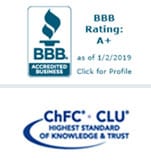

Want to strengthen your relationships, improve your physical health, and relieve stress? The answer, according to several scientific studies, might be gratitude. Believe it or not, gratitude can also positively impact your finances—and not just because it’s free. Gratitude draws our attention to the parts of our financial lives that are overlooked, underutilized, or ignored. Here are four common financial benefits to be grateful for.
Be Grateful for the Company Match
Does your employer match your contribution to your 401(k) or other employer-sponsored retirement plan? About 75% of companies that offer a 401(k) also offer a company match. However, 20% of workers do not contribute enough to their retirement accounts to earn the match. Understanding your company’s retirement plan will help you grow your savings beyond what you could achieve on your own.
Be Grateful for Compounding Interest
Compounding interest: Einstein called it the eighth wonder of the world and, when used properly, it really is wonderful. Since interest builds on itself, it is both a saver’s best friend and a debtor’s worst enemy. In order to capitalize on the full power of compounding interest, the money in your interest-drawing account must remain untouched. On the other hand, if you rack up debt, compounding interest will add up, making your balance more difficult to pay off. This is why it’s important to pay off debt as quickly as possible. Use this calculator to see how compounding interest will affect your savings.
Be Grateful for Roth Conversions
If you expect to be in a higher tax bracket after you retire, converting your traditional IRA to a Roth IRA might save you from a heftier tax burden in the long run. This is because Roth IRA withdrawals occur tax-free as long as you are over age 59 ½. However, you will need to pay taxes during the initial conversion. A financial professional can help you determine if this is in your best interest.
Be Grateful for Customized Retirement Plans
One of the biggest concerns we hear from our clients is the fear of running out of money in retirement. Having a plan to build and preserve your retirement savings is crucial. The first step is to plot your post-retirement lifestyle. Will you travel? Will you dine out? How much will you spend on gas and groceries? And what will those expenses look like after inflation? This looks different for everyone. The other key component is to make sure your savings are on track. By age 30, you should have your annual salary saved in a retirement account such as an IRA or 401(k). By 35, you should have double your annual salary, and by 67 you should have ten times your annual salary stocked away.


Sara McKinney
saractag@gmail.com
As Cowen Tax Advisory Group’s Digital Content Marketing Specialist, Sara provides in-house copywriting and manages the company’s electronic records system, email marketing, and blog.




